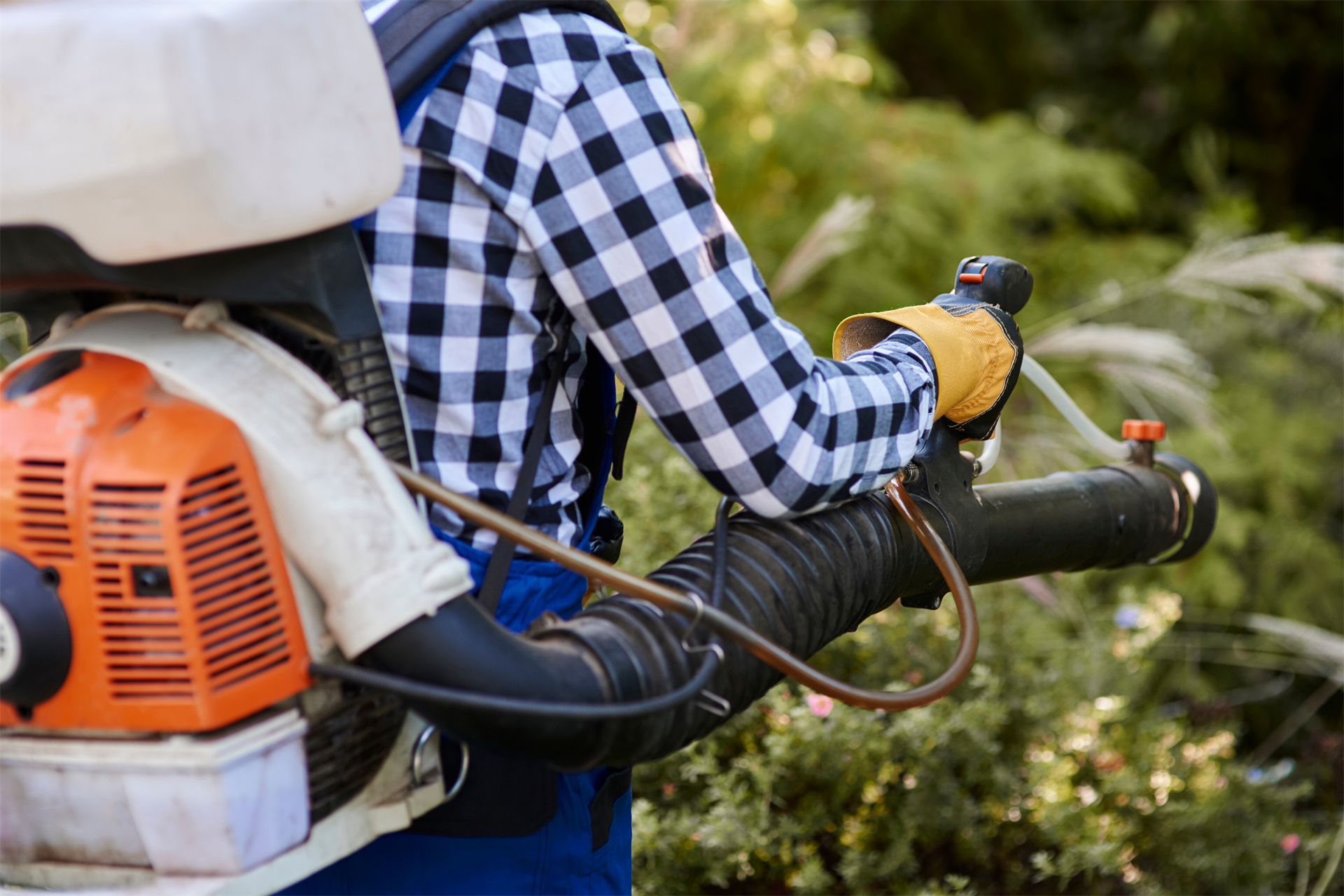
Author: Dell deChant
Lately there has been a spate of articles in big-time publications about gas-powered leaf blowers and their harm to the environment. The New York Times, The Wall Street Journal, The Atlantic, The New Haven Register, Audubon Magazine, and Yale Climate Connections all have recently weighed in on the topic. Of course, leaf blowers are not the only yard and garden machines doing disproportionally large environmental damage. Others include such well-known machines as the lawn mower, line trimmer, edger, and hedge trimmer. Gas-powered versions of these machines are high carbon emitters and particularly inefficient in their use of fuel.
As my long-time friend, Charlie Wilde, told me years ago, as a rule, the smaller the engine the less efficient is its energy use – and all those little lawn machines have very small engines. The recent articles underscore Charlie’s assessment. As noted by Margaret Renkl in The New York Times:
A 2011 study by Edmunds found that a two-stroke gasoline-powered leaf blower spewed out more pollution than a 6,200-pound Ford F-150 SVT Raptor pickup truck. Jason Kavanagh, the engineering editor at Edmunds at the time, noted that “hydrocarbon emissions from a half-hour of yard work with the two-stroke leaf blower are about the same as a 3,900-mile drive from Texas to Alaska in a Raptor.”
James Fallows and the leaf-blower menace
Most of the recent articles cite a 2019 article in The Atlantic, by James Fallows. What makes Fallows’ article especially notable is that besides offering well-researched information on why small (two-stroke) engines are so damaging, it also includes a helpful narrative about how he, his spouse, and others organized a successful effort to eliminate what he called “the leaf-blower menace” in his city – Washington, D.C. That part of the article is worth reading all on it own. It is a virtual playbook on how grassroots organizing works.
Besides making clear the necessity of commitment and perseverance (they faced resistance and setbacks) for such efforts, it also identifies the place to begin – the neighborhood. That’s where the Fallows began, but it is not where many well-intentioned initiatives begin. Instead, folks often take their proposals directly to City Councils and County Commissions. The Fallows did eventually get the proposal to their City Council, but only after gaining support from their neighbors, then their neighborhood, and finally other neighborhoods in their city. This takes time, and there can be difficulties – and even good projects fail. This one worked out and, as Fallows tells us “On January 1, 2022, the use of gas-powered leaf blowers will be illegal within city limits.”
What About Florida?
That’s good news for Washington, D.C., but what about other cities and what about Florida? Renkl reports over 100 cities nationwide ban or restrict the use of gas-powered leaf blowers. It is not clear how many cities in Florida have bans on leaf blowers or other high-polluting inefficient gas-powered lawn machines. It appears that some cities have restrictions (usually based on hours of operation, due to noise) but few have outright bans. Naples appears to be the only one, although there have been initiatives in Winter Park and Ft. Lauderdale.
I wonder how many folks even have the stomach for taking up the issue – especially considering the polarizing nature of politics today and aggressive actions by the governor and the state legislature to limit home rule in a variety of areas related to public health and the natural environment. It seems unlikely an initiative such as the Fallows organized in the nation’s capital could get off the ground in many Florida cities.
Five Reasons to Let Them Go
Even if there is little interest on the part of government to take responsible action, we can always act on our own and even encourage friends, neighbors, and our lawn-care providers to dispense with the machines. Here are five reasons to let them go:
(1) They are highly polluting and disproportionately high in production of greenhouse gasses.
(2) They are noisy, with dangerously high decibel levels, and aurally violent.
(3) Efficient electrical alternatives are available, which are quieter and less polluting.
(4) Ultimately, they are not necessary. Why spend the money? Why consume more resources? Remember rakes? Remember brooms? Leaves and grasses can be swept or raked by hand from impervious surfaces if removal is really necessary. Moreover, why not leave the leaves and grasses on the lawn, or rake them into garden beds where they can serve as natural soil amenities?
(5) Finally (and best of all), they are not needed if we just rid ourselves of lawns. Doing that will eliminate the need for all the gas-powered yard machines. There are two good options for yard replacement: (a) a natural landscape of native plants and (b) a food-producing garden. Neither will need to be mowed, trimmed, or blown with gas-powered machines. Both will sequester carbon not generate it, heal the earth not pollute it, create habitat not harm for creatures sharing our world, beautify not traumatize the community, and restore not disrupt our sense of place – and return a little bit of peace to the place that was there before we showed up.
References and Additional Sources
“Are leaf blowers bad for us?” (January 21, 2021), Yale Climate Connections – Sara Peach
“The First Thing We Do, Let’s Kill All the Leaf Blowers” (Oct 25, 2021), New York Times Margaret Renkl
“Get Off My Lawn” (April 2019), The Atlantic – James Fallows
“Here’s Why Leaf Blowers Are Evil Incarnate,” (October 7, 2021), The Wall Street Journal) – Kris Frieswick
“Hi, I’m a Leaf Blower. Everybody Hates Me” (November 12, 2021), The Wall Street Journal – A Leaf Blower (Jason Gay)
“Those Loud and Polluting Leaf Blowers” (Nov. 5, 2021), New York Times – letters
“Why Cities are Taking Action to Limit Loud and Polluting Lawn Care (Spring 2021), Audubon Magazine – Monica Cardoza.
https://www.audubon.org/magazine/spring-2021/why-cities-are-taking-action-limit-loud-and
Or just Google-search leaf blower article
 Dell deChant is the Associate Chair of the Department of Religious Studies at the University of South Florida. He is a Master Instructor and has served at USF since 1986. The author of three books, over 40 articles in professional publications, and chapters in twelve books, his specialization is religion and contemporary cultures. His current research focuses on religious, literary, and ecological expressions of Agrarianism as they manifest in American popular culture. He is Chair of the Environmental Committee of the City of New Port Richey, a founding member of Food Policy Council of Pasco County, a member of the Florida Food Policy Council, and a member of the Board of Directors of Ecology Florida.
Dell deChant is the Associate Chair of the Department of Religious Studies at the University of South Florida. He is a Master Instructor and has served at USF since 1986. The author of three books, over 40 articles in professional publications, and chapters in twelve books, his specialization is religion and contemporary cultures. His current research focuses on religious, literary, and ecological expressions of Agrarianism as they manifest in American popular culture. He is Chair of the Environmental Committee of the City of New Port Richey, a founding member of Food Policy Council of Pasco County, a member of the Florida Food Policy Council, and a member of the Board of Directors of Ecology Florida.